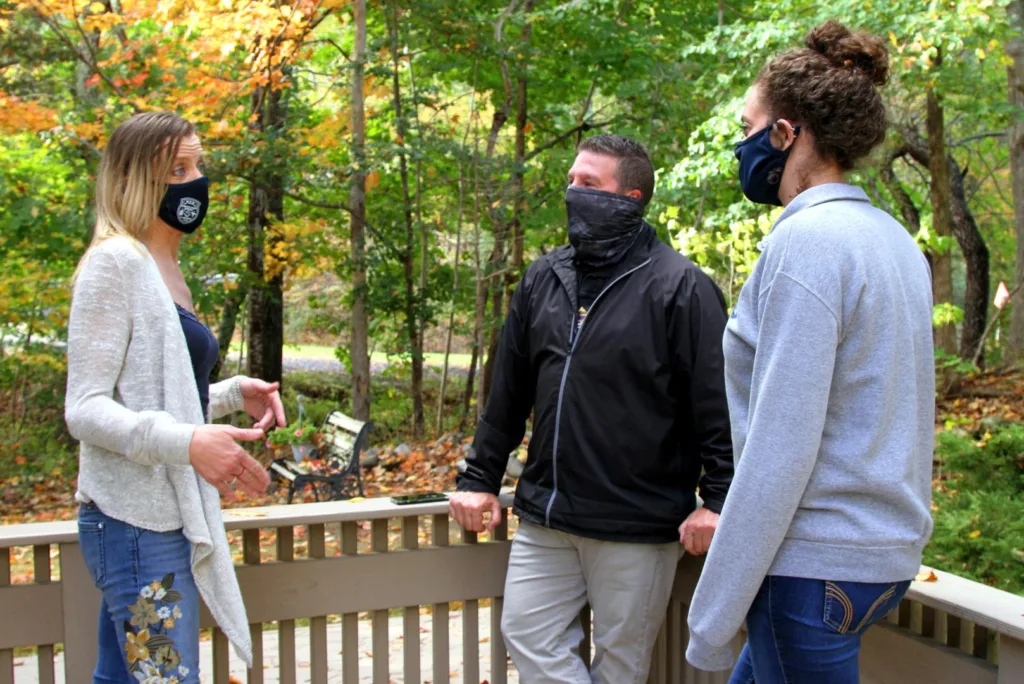How Plymouth County Outreach Stepped Up During the Pandemic Shutdown
PLYMOUTH — Andie Brennan was 36 years old when she first started using heroin.
Recently divorced and “lacking structure” in her life, she would experience several ups and downs over the next eight years, although at times there were far more down moments than she wanted to admit. It wasn’t long after she started using when she had her first overdose.
Fast forward to 2020. When the COVID-19 pandemic hit and things began shutting down, Brennan found many of the factors that led to her substance use disorder returning in full force. There was isolation, confusion, frustration and desperation.
But this time, she had a lifeline she didn’t have before.
Brennan still remembers the first time she met Haley Kennedy, Recovery Coach for Plymouth County Outreach. Kennedy visited her at her Marshfield home, along with a plain-clothed outreach officer from the Marshfield Police Department. The conversations started out simple enough, but soon Brennan and Kennedy would develop a connection that Brennan said has made all the difference.
“I didn’t know what to expect when I first met Haley,” Brennan said. “But all this time later, I’m so grateful for everything she’s done for me. She makes me feel comfortable. Your first thoughts when you meet someone like her are, ‘Are they going to be against me?’ ‘Is it safe to talk with them in front of the police?’ ‘Do they really understand what I am going through?’ With Haley, none of that has ever been an issue.”
Brennan had a visit late last month from Kennedy and Marshfield Police Detective Greg Davis. She said she knows how busy the two are, and the fact that they would each take a few hours out of their day means more than she can put into words.
“Police officers often see people at their worst and at their most vulnerable, but the goal is to reassure those we come into contact with that we are on their side and that we all have the same goal of helping people,” Detective Davis said. “Especially now, people need help and support, and it means a lot to be able to give that to them.”
The COVID factor
For Brennan, simply having someone to talk to has been one of the most positive aspects of her relationship with PCO. But for many struggling with substance use disorder both throughout the South Shore and across the country, that connection has been severely lacking in the age of COVID-19.
According to a recent report from the nonprofit research support organization The Commonwealth Fund, drug overdoses in the United States reached an all time high this summer, with many experts believing the pandemic has been a significant contributing factor.
Specifically, experts believe, the isolation that resulted from COVID-19-related shutdowns made the already difficult recovery process even harder.
“We knew things were going to be bad when COVID hit and services and resources started closing everywhere,” Kennedy said. “But that made it all the more clear that we needed to reach out to people in need and stay connected with them.”
Kennedy is not shy about opening up about her own past with substance use disorder, and she uses her empathy every day on the job.
“I can relate to what people go through with their substance use disorder, and if I find myself struggling during particularly troubling times, I can only imagine what others might be going through,” she said. “For people who might not have anyone to turn to, or who don’t know how to navigate these resources, something like COVID can be beyond difficult.”
One of those individuals was Kevin, a Plymouth resident who did not wish to have his last name published. He said he experienced every struggle imaginable from the start of the pandemic.
“When the virus hit I was actually sober,” Kevin said. “I had lost my job [due in part to the shutdown], and I was just sitting at home with nothing but my thoughts. With everything going on, you feel alone and without a purpose. You can’t go places, and you can’t see anyone. It really affects your mood, and the decisions you make each day.”
Then something unexpected happened. Kevin received his stimulus check in the mail.
“The temptation to get high was very, very real,” he said. “Just like that, things start to spiral.”
Kevin said PCO reached out to him continuously during the early months of the pandemic, and the outreach remained consistent throughout the summer and into the fall.
“They would reach out first through phone or text, and multiple times they came out to see me,” he said. “They wore masks, and kept a safe distance away, but never let the virus get in the way of doing their job. What mattered to me was that they were there, no matter what, even if things couldn’t be the same as they were. It wasn’t just a check in and then a ‘well, good luck with everything.’ They follow up, they remember who you are and what you need, and you know when they reach out that you’re not just a name or a number, you’re a real person.”
Anticipating the Needs
Between Jan. 1 and Sept. 30 of this year, PCO recorded 105 fatal overdoses in Plymouth County, and 822 non-fatal overdoses. This is compared to 102 fatal overdoses and 861 non-fatal overdoses during the same time period in 2019.
This data seems to counter the trend of rising incidents seen in many parts of the country due to the pandemic, and PCO Program Director Vicky Butler believes part of that is due to the resources PCO and their community partners made available throughout the year.
“Even while cases were rising quickly this spring, PCO recovery coaches were on-call seven days a week offering people support, assistance in accessing treatment, providing resources, assisting in scheduling appointments, providing Narcan and fentanyl test strips, really whatever they needed,” Butler said.
Community members can connect with Recovery Coaches through the connect page on the PCO website, through any of the organization’s social media platforms, or by phone, 508-830-4218 ext. 261.
“Making resources more available and connecting individuals with the services they need is our top priority, and at no time has that been more important than during the pandemic,” Butler said. “During this time we’ve been extremely grateful for the commitment of our Outreach Officers, recovery coaches and community partners. It truly has taken a team effort to keep resources and services available despite so much around us closing down or cutting back. We knew that wasn’t an option for us.”
PCO Operations Supervisor Hannah Panteleos worked diligently to share free, virtual resources and create new resources where gaps existed. PCO offered ZOOM office hours on Thursdays from 2-3 p.m. as well as a virtual recovery meeting on Tuesdays from noon to 1 p.m. Recovery Unscripted is a safe, inclusive meeting space for people in all forms of recovery regardless of their chosen path. These resources will continue to remain available for the foreseeable future.
For a full list of services, see the PCO blog.
‘In This Together’
Cecelia Cacciatore, a police officer with the East Bridgewater Police Department, said the pandemic greatly restricted in-person treatment options for many and increased the number of individuals requiring dual mental health and substance use assistance. As an officer who is closely involved with Plymouth County Outreach, she partners with PCO recovery coaches regularly to help identify those individuals who may require assistance navigating through available resources.
“I think this pandemic has really placed a toll on all demographics within our community in different ways, and this has impacted the types of calls and the frequency of responses by police officers,” Cacciatore said. “Once we were in the midst of the pandemic, there seemed to be a spike of substance use and mental health calls that EBPD was responding to, but once society started to settle into a routine, I feel like there was a significant decrease in calls for overdoses/intoxicated parties and more of a shift to helping the public answer, ‘how can we help our loved ones suffering during this time?’”
Cacciatore shares Butler’s mindset that keeping services available can make all the difference for those in need.
“We are doing our best to speak with these individuals in person and connect them with the resources that best suit their needs,” she said. “The pandemic has opened up new challenges with making these connections, but we are continuing to educate ourselves and the community with what is available.”
That level of commitment, and recognizing the need to be creative with their services, is perhaps what Brennan appreciates most about PCO’s outreach during the pandemic.
“They do whatever they can to stay connected, and even during a pandemic when so much has changed, that part never did,” Brennan said. “People say that if you chase your recovery half as hard as you chase your drugs, you can make it through the day, and when you have people like [Haley Kennedy] in your corner, you actually want to chase your recovery. She’s been there for me from the first day we met, and she promised me she’d always be in my corner no matter what. I always knew she cared, but until the pandemic hit, I didn’t know just how much she meant it, but I do now.”
###

